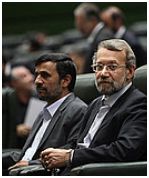The Nation Protests As the Administration Violates
Amidst the fight between Mahmoud Ahmadinejad’s administration and the Majlis, Iran’s parliament, when the ideologue MPs warned Ahmadinejad of his growing non-compliance of laws passed by the eighth parliament, he dismissively responded that he was representing “the most law-abiding administration since the Islamic Revolution” of 1979. Shortly after this claims, the head of the Court of Administrative Justice (the body constitutionally responsible for administering public complaints of the government bureaucracy) reported that sixty-three thousand complaints had been filed concerning violations of various government agencies and administrative branches in the past eight months.
Mohammad Jafar Montazeri, the head of the Court of Administrative Justicet, at a convention under the title of “Improving the Administrative System and the Fight against Corruption” stated, “People evaluate the government by looking at how agencies, ministries, and organizations perform. If we don’t make progress in identifying the pathology and the remedies in this regard, we have let down the administrative system as well as the people, and that means being unfaithful to Islam and the values of the martyrs.” He added, “Of those sixty-three thousand complaints, eighteen thousands have been accepted as valid. Twenty-three thousand have been rejected and fourteen thousand have been provisionally rejected some of which may be resubmitted again.”
While citing “disregard for the law and the lack of legal knowledge among officials” to be some of the reasons for the rise in violations, he also emphasized, “Sometimes failure to recruit experts causes problems that can escalate to complaints. Another reason is that some governmental offices and administrative branches promise more than they can deliver. These promises create expectations that if not satisfied could in turn bring forth complaints.”
Larijani: Corruption Exists
Along with the remarks of the head of the Court of Administrative Justice, Iran’s speaker of the Majlis Ali Larijani also said, “The executive and the judiciary should be capable of a level of oversight that enables them to provide more realistic results in the fight against corruption and should value the reports of their own analysts. They should work towards implementing them.” By saying that “propaganda helps to ignore the expert reports on corruption”, he clarified, “the responsible organizations should act in this regard in such a way that all the mentioned problems could be solved in a systematic manner so that people could be assured of the independence and impartiality of oversight organizations in the fight against corruption.”
Emphasizing “the rule of law”, Ali Larijani highlighted, “Corruption is an insidious matter so privileges of governmental branches can lead to corruption; centralized systems may impede smaller sections from participating in various aspects of the State and this may in turn cause increased corruption in those sections.” Also by saying that “corruption brings further corruption and impacts other sections, Larijani pleaded for expediting corruption and violation cases and added, “ In my opinion the judiciary branch of the government has performed well in this regard but the judicial approach towards corruption should be more preventative than punitive.”


